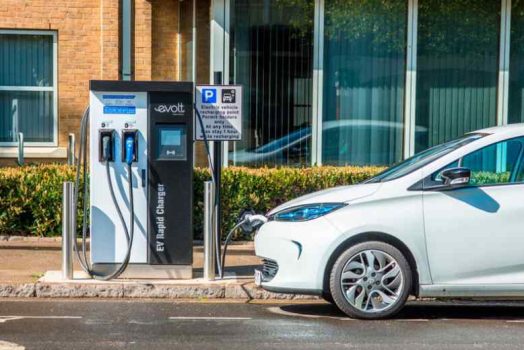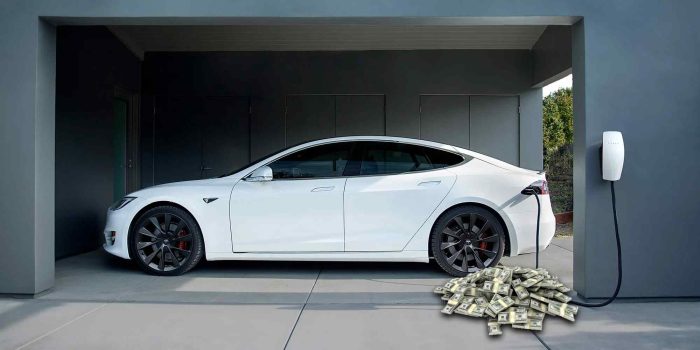An average American drives around 13,000 miles annually, with an average of 1083 miles per month. Let’s say 1100 miles for easy calculation.
An electric car gives an average of 3-5 miles per kWh. Let’s say 4 miles per kWh of easy calculation. You will use 275 (1100/4) kWh per month.
With an average electricity price of $0.168 per kWh, the average monthly cost to charge an EV is $46.2 (275*0.168).

Please note that this is an average and not the exact figure. The price you would actually pay depends on several factors, such as your car mileage, rates per kWh in your region, time of the day, type of charger, whether you charge at home or a commercial station, and various other factors.
This article explains all these factors and explains whether an EV is a better option than a conventional gasoline car.
Electric Car Charging Cost Formula
The formula for the cost of charging an electric car is as follows.
Charging Cost = (car range in miles/ range per kWh) x cost per kWh
The formula works by dividing car range in miles by range per kWh. It then multiplies the answer by cost per kWh. You can refer to a car’s user manual to find out its range in miles (total mileage on a full charge) and range per kWh (mileage per kWh). Check your home’s latest electricity bill for electricity per kWh.
Factors Affecting Electric Car Charging Cost
Electricity Cost
The cost of electricity varies by region, with prices ranging from $0.09 to $0.35 per kWh. The national average is around $0.168 per kWh. Knowing the local electricity rate is crucial for EV owners.
Home Charging
Electricity rates are influenced by location, time of year, and time of day. Rates are generally lower during off-peak hours, typically late at night. Charging at home is usually the most cost-effective option.
Commercial Charging Station
Costs at commercial charging stations vary depending on the network and membership status. Charging at a commercial Level 3 charger can cost between $10 and $40. Some workplaces, restaurants, and parking spaces offer free or discounted EV charging.
Type of Charger
Level 2 and Level 3 chargers have different costs and charging speeds. Installing a Level 2 charger costs around $2,000, but it can cut charging time in half and add value to your home. Rebates and incentives may be available to offset costs.
Charging Speed
Level 3 chargers are found in commercial settings and are more expensive to install at home. Home charging is the best option for most EV owners, but knowing where to find public charging options is also important.
Type of Electric Car
Different EVs have varying battery capacities, which affect charging time and cost. Larger batteries require more electricity, increasing the cost of charging the vehicle.
How much does it Cost to Charge a Tesla?
The average cost to charge a Tesla is $15, but it varies from $10 to $19.
Here are the average charging costs for different Tesla Models
- Model 3: $10.50
- Model S: $17.50
- Model X: $18.00
- Model Y: $15
The prices above are just average and may vary based on the abovementioned factors.

Fill a Gas Tank vs. Charge an Electric Car: Which is Cheaper
The average price for a gallon of gasoline is $3.62 (at the time of writing). We take 12 gallons for calculation because that’s the maximum you can fill in a small car. Multiply the two numbers, and you get $43.44. That’s what it costs to fill an average American car.
The debate comes down to how much mileage a car gives in a full gasoline tank compared to a full recharge. For example, an EV travels 360 miles in a full recharge, and a car of the same specs travels 400 miles in a full gas tank. It costs $46.2 to recharge the car and $43.44 to refuel a tank. Gasoline-powered car is cheaper in this example. But this is not it; some EVs may give better averages than gasoline cars in some scenarios.
It all depends on the particular car, gasoline/electricity rates, and your preferences. Moreover, planning a long trip on EV is a bit complicated due to the sacristy of chargers in remote areas.